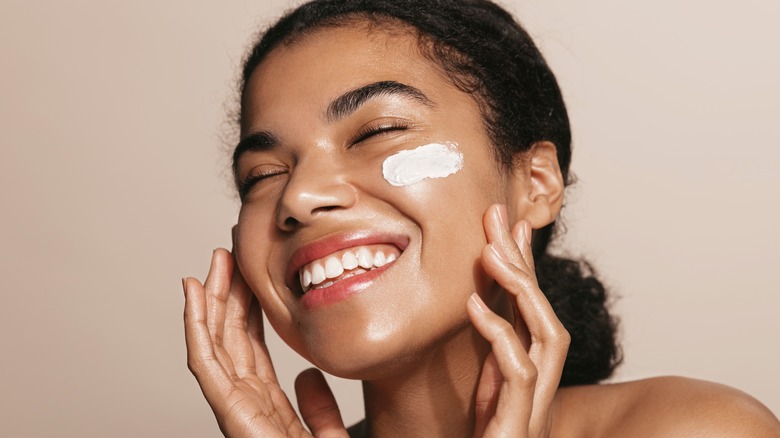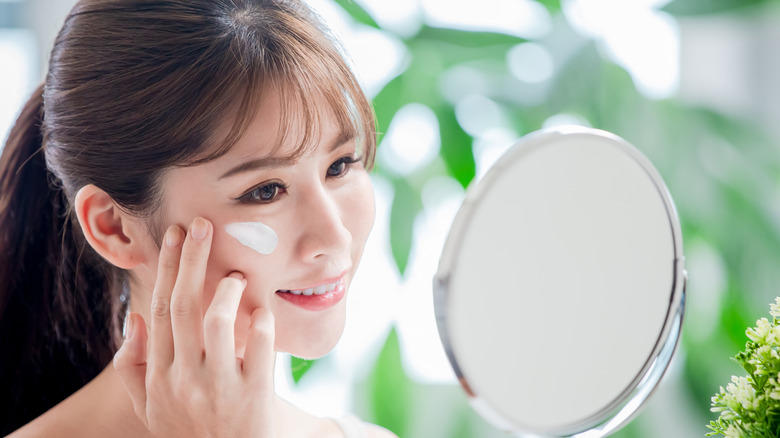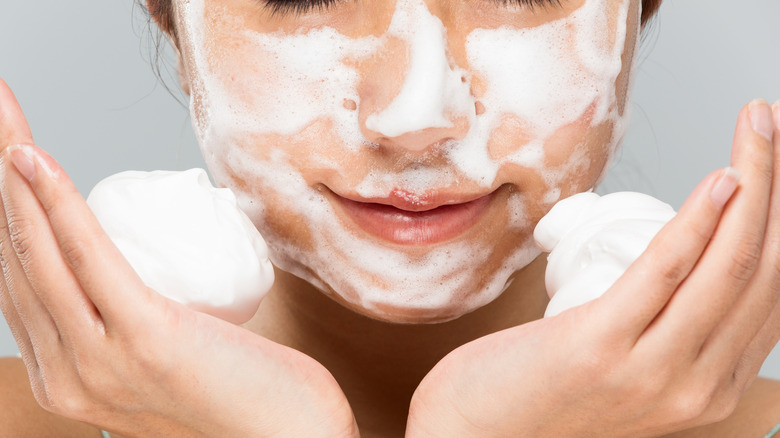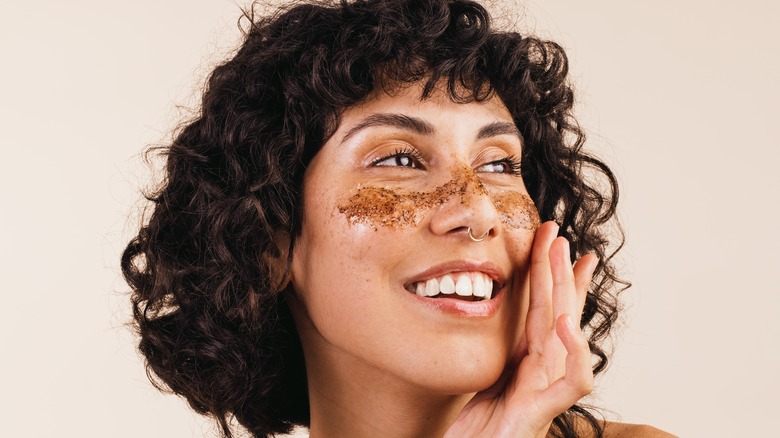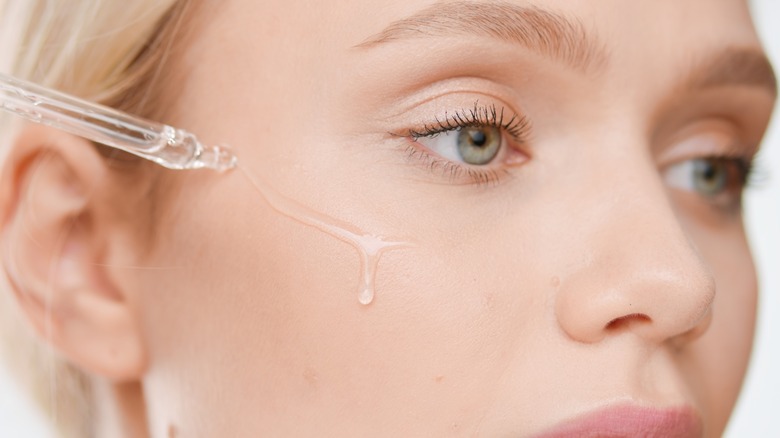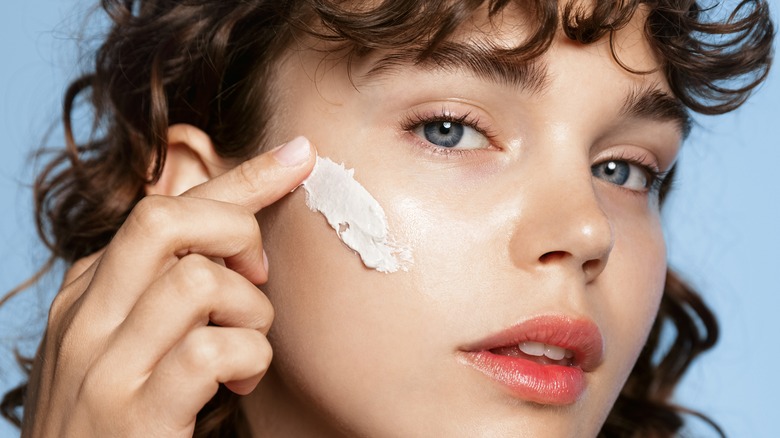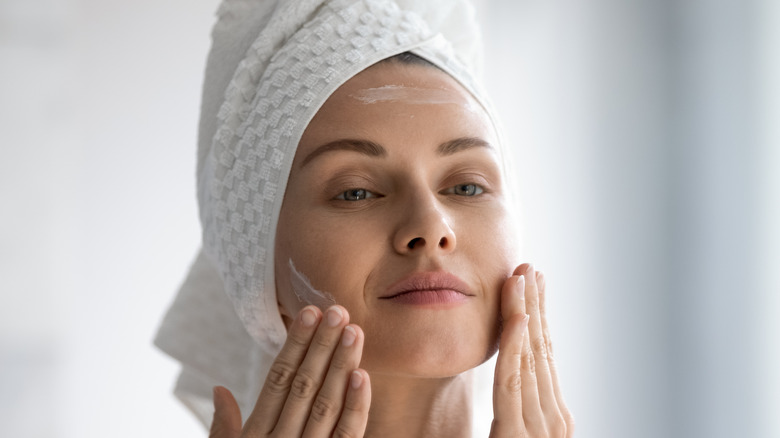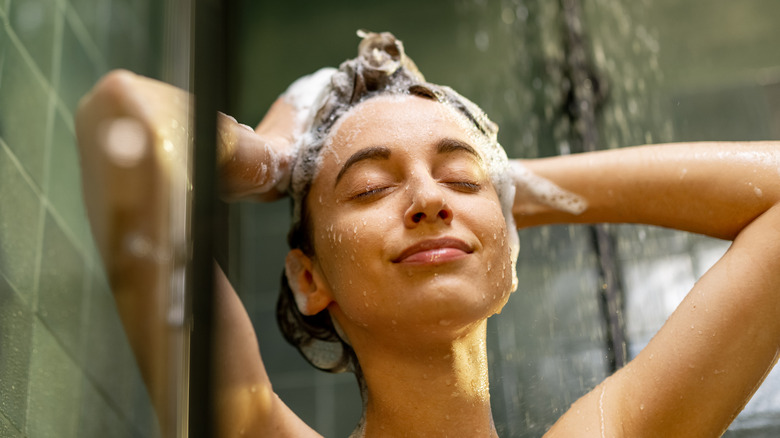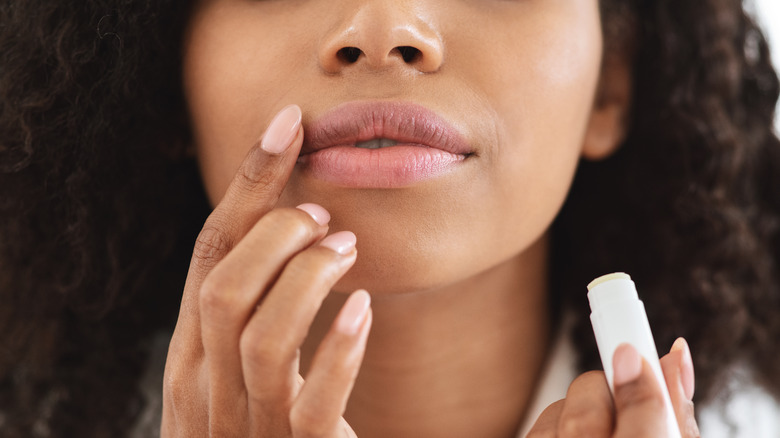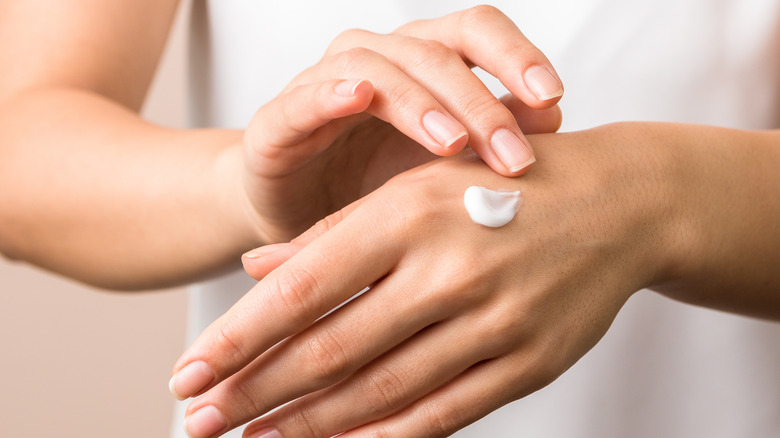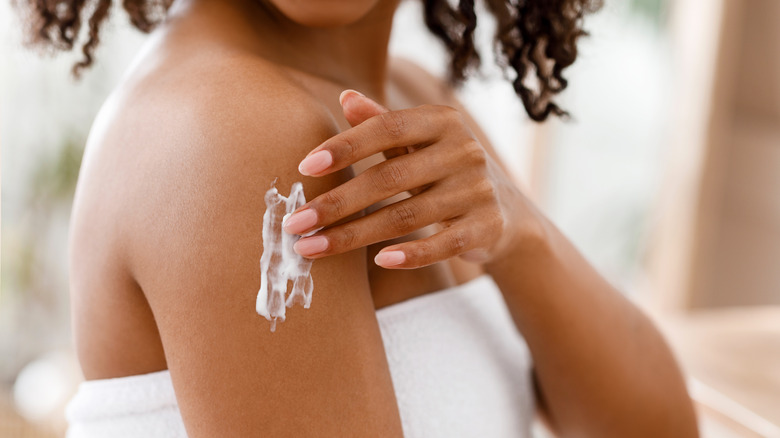The Skin Care Tips You Need To Get Through This Winter With Glowing Skin
We may receive a commission on purchases made from links.
It's hard to believe, we know, but winter is just around the corner. If you're anything like us, you've probably already started curating holiday gifts, researching the best Black Friday sales, and planning what you're going to do on New Year's Eve — and if there's one thing you don't want to stress about this winter, it's your skin. According to Dermcare, the cold temperatures, harsh winds, and low humidity levels that come with the season can make your skin dry and irritated, which nobody wants.
Knowing how to properly take care of your skin can be both confusing and overwhelming. If you don't have a dermatologist, it's difficult to know who or what to turn to for tips, tricks, and general advice — and so many skin care influencers on social media seem to contradict each other. Luckily, we're here to save the day. We have all of the skin care tips that are essential to maintaining a healthy glow throughout this coming winter. Say goodbye to flaky, itchy, and inflamed skin, and say hello to intense hydration!
Wear sunscreen, even when you can't see the sun
Using sunscreen on a daily basis is one of the most important things you can do for your skin — all year round. Even though ultraviolet B (UVB) rays are strongest during the summer, they're still present during the winter — and bright surfaces like snow and ice can reflect these rays and cause skin damage, the Skin Cancer Foundation reports. In fact, snow can reflect up to 80% of the light that comes from the sun. Because of this, it's important to wear sunscreen every single day, even in the dead of winter.
Not only does sunscreen prevent skin damage and symptoms of premature aging such as wrinkles, saggy skin, and age or sun spots, but wearing it also drastically lowers your chances of developing skin cancers and/or skin precancers (per the Skin Cancer Foundation). Specifically, sunscreen can lower the risk of developing squamous cell carcinoma (SCC) by about 40%, and melanoma by 50%.
When choosing a sun protection product, you can either go for a mineral sunscreen (which blocks sun rays) or a chemical sunscreen (which absorbs sun rays before they can touch the skin). We recommend Elta MD's UV Daily Broad-Spectrum SPF 40, which also comes in a tinted formula so you can wear it as a base layer of makeup.
Use a gentle, hydrating cleanser
Because the winter climate is often so drying to the skin, it's important to make sure that the products you use don't strip away the moisture and oil that your skin naturally produces. Many of us have been brought up on the myth that any oil is bad oil, but our skin naturally produces oils in an effort to keep it hydrated, which is especially helpful during the winter season.
Harsh ingredients like alcohol, fragrances, and sulfates (which may appear as SLS and/or SLES in ingredients lists) can remove too much oil from the skin, leaving the skin barrier (the outer layer) dry and itchy (per WebMD). Because your skin is especially vulnerable during the winter, it's important to use hydrating products that don't strip the skin, but rather supply it with additional moisture.
Skin care often starts with cleansing, and a gentle, moisturizing facial cleanser is vital to healthy, hydrated skin. There are a ton of options for hydrating facial cleansers, both at the drugstore and at retail stores like Sephora and Ulta. For a less expensive option, we highly recommend the La Roche-Posay Toleriane Hydrating Cleanser or the Vanicream Gentle Facial Cleanser, both of which should be available at most chain drugstores. If you're willing to spend some extra money on skin care, we recommend the Glossier Milky Jelly Cleanser (which is available at Sephora) or the Fresh Soy Face Cleanser.
Exfoliate to allow your skin care products to absorb deeper into the skin
If you have dry skin, you're probably familiar with those annoying flakes that show up during the brisk winter months. According to a Bustle article, exfoliating not only helps to smooth out this flaky skin, but also allows your other skin care products, like serums and moisturizers, to penetrate deeper, which means your skin will absorb more hydration than it otherwise would.
There are a couple of different ways to exfoliate: You can either use a physical exfoliant (which often relies on small, textured particles like poppy seeds or bamboo powder to remove dead skin cells) or a chemical exfoliant (which usually contains alpha-hydroxy acids or beta-hydroxy acids), Vogue reports. Chemical exfoliants are often more gentle than physical ones, which can be an important consideration when skin is more vulnerable in the winter.
How often should you exfoliate? That depends on your skin type — Heyday Skincare recommends that on average, people should exfoliate a few times a week, but those with sensitive skin can lower that number to once or twice a week. We recommend starting with one exfoliation per week and working your way up as necessary.
Use a hydrating serum to prevent skin from drying out
We like to think of serums as supplements for the skin: You can pretty much choose what you'd like to focus on and/or any areas of concern — such as anti-aging, brightening, or hydrating — and hone in on that. Because serums are often made up of smaller molecules than, say, a moisturizer, they can penetrate powerful, active ingredients directly into the skin (per Into the Gloss). Serums that contain humectants, which help to increase the skin's moisture, can really pack a punch in terms of hydration, a Vogue article reports. Because of this, using a hydrating serum can be especially impactful during the winter season, when the skin typically craves extra moisture.
Like any other skin care products, hydrating serums range in price, but there are some high-quality options that won't break the bank. For example, CeraVe Hydrating Hyaluronic Acid Serum can be found pretty much anywhere, and Krave Beauty Great Barrier Relief Serum is an affordable, environmentally friendly product that will last a long time.
Layer on a creamy, rich moisturizer to lock in hydration
While a more lightweight lotion will probably work for most skin types during the summer, the cold, dry winter climate can sometimes require a heavier, richer moisturizing cream — especially for those who already have dry skin. As Healthline reports, these richer moisturizers often better hydrate the skin and lock in moisture. Moisturizers also help to strengthen the skin's barrier, which helps prevent irritation from cold, dry air and gusts of wind. Even if you continue to use a more lightweight lotion after washing your face in the mornings, applying a thicker cream at night can help hydrate and revitalize the skin while you sleep.
With so many different kinds of moisturizers available, it can be challenging to decide which is the right one for you. From the drugstore, we recommend the Neutrogena Hydro Boost Water Gel, which has been compared to much more expensive products like the Tatcha The Dewy Skin Cream. If you're planning a trip to Target, check out the Versed Skin Soak Rich Moisture Cream. And if you're willing to devote some more money to your skin care, look into Kiehl's Ultra Facial Cream, which has a super gentle formula that's friendly to sensitive skin.
Apply products while your skin is damp to help lock in moisture
This may sound slightly bizarre, but according to Healthline, some skin care products become more effective when they're applied to skin that is damp as opposed to skin that is dry. "When skin is already damp, it's hydrated. The moisturizer can then either provide more hydration or just seal it in," says Dr. Dina Strachan. So, instead of making sure your skin is fully dry before you reach for those serums and moisturizers, just pat your face until it's damp after you wash it, and then apply those products.
However, as Dr. Michelle Farber reports, via Skincare.com, it's important to be careful when applying more potent products — like serums — to your face while it's damp. Unless the serum you're using is hydrating, the increased absorption that comes with applying products to damp skin may cause increased irritation, as they're able to penetrate deeper into the skin. So, be mindful of any irritation or changes in your skin after using certain products on skin that isn't dry. Dr. Farber shares that you should never apply sunscreen on top of damp skin, but moisturizer actually should be applied to damp skin to get the most use out of it.
Invest in an air humidifier
Cold temperatures and harsh, brisk winds are some of the main factors that impact your skin during the winter season, but the low humidity levels that come with using indoor heaters also have a big impact. According to Art of Dermatology, when there are low levels of humidity, the surrounding air will suck moisture from anywhere it can, including the top layer of the skin. In turn, the skin can become dry and cracked when exposed to indoor heating systems, even when using hydrating skin care products.
That doesn't mean you have to turn off the heaters in your house. Instead, you can simply install a humidifier, which will keep the air inside of your house at a more ideal humidity level for your skin. Humidifiers are sold pretty much anywhere you can find personal care and/or home products, like drugstores, Target, Walmart, and The Home Depot. For the most part, they're not unreasonably expensive and can make a big difference in how your skin looks and feels.
Try to avoid scalding-hot showers
We know, we know ... there's probably nothing you want to do more at the end of a long, cold day than jump into a steamy, hot shower — but this habit could actually be harming your skin. According to InStyle, hot water tends to strip the skin of its natural oils, which are already at a low during the winter. This can leave the skin more dehydrated than it was before the shower, and it can make those hydrating cleansers, serums, and moisturizers that you're applying after the shower less effective. Also, as Allure reports, other skin barrier issues — such as eczema, psoriasis, and acne — can be worsened by hot showers.
In an article on Skincare.com, Dr. Michael Kaminer recommends taking shorter showers, adjusting the temperature from hot to warm, and making sure the shower doors are fully closed to trap any humidity. This may sound like a hassle, but your skin will thank you!
Don't forget to hydrate your lips
Clearly, we're very focused on keeping the skin on your face moisturized and healthy during the winter months, but it's just as important to keep your lips hydrated. Just like the skin on our faces and bodies, the skin on our lips is affected by the winter season. Exposure to cold temperatures, harsh winds, and low humidity levels can negatively impact them. As InStyle reports, our lips also have significantly fewer layers of skin than our face and body, and they don't have oil glands like the rest of our body, which means they don't naturally produce any moisture.
Because of this, it's necessary to regularly moisturize the lips with a soothing, hydrating lip balm formula. There is a wide range of lip products on the market, but we recommend sticking to ultra-hydrating ointments like Vaseline, Aquaphor, and/or Carmex. As Dr. Joshua Zeichner told Refinery29, it's best to avoid ingredients like salicylic acid, camphor, phenol, and menthol, all of which may dry the lips out rather than moisturize them.
Keep a quality hand cream on deck
Like the skin on your face, the skin on your hands also struggles with problems like dryness, cracking, and peeling due to the winter's low humidity levels and cold temperatures. Your hands are especially susceptible to becoming dry and irritated in the winter because of how often you're washing them to avoid colds and any other bugs, which can strip the skin — especially if you're using soaps with ingredients that are drying. Because of this, a thick, moisturizing hand cream is an absolute must in the colder months.
There are plenty of different moisturizing hand creams on the market, but we have some recommendations to help you narrow down your options. If you're not looking to spend a ton of money, look into the Gold Bond Ultimate Healing Hand Cream, which retails for around $5 depending on where you purchase it. Another great, lesser expensive option is the Eucerin Advanced Repair Hand Cream. If you're looking for an even richer formula, you can't go wrong with Kiehl's Ultimate Strength Hand Salve, which starts at $16.
Moisturize your entire body to prevent dry, irritated skin
Even though most of us are layering long sleeves under sweaters, leggings under pants, and long parka jackets over all of the above during the winter to reduce exposure to cold air and wind, the low humidity levels during the winter – both indoors and outdoors — still manage to suck the moisture out of our skin. Because of this, it's extremely important to moisturize your entire body on a daily basis to ensure that the skin stays as healthy and hydrated as possible.
Our favorite body moisturizers and lotions have simple formulas, like the Aveeno Daily Moisturizing Body Lotion with Soothing Oat. We also love the ultra-rich CeraVe Moisturizing Cream, which you can use on both your face and body. (Side note: Just like your face, moisturizing your body while it's still damp after a shower helps to lock in more moisture, per Everyday Health.)
Also, exfoliating your body helps get rid of dead skin and, in the words of Erica Cerpa (the founder of and an aesthetician at EC Beauty Studio and Spa in Hoboken, New Jersey), "make room for healthy cells" (per AEDIT). Exfoliated skin allows other products to penetrate deeper and work more effectively.
